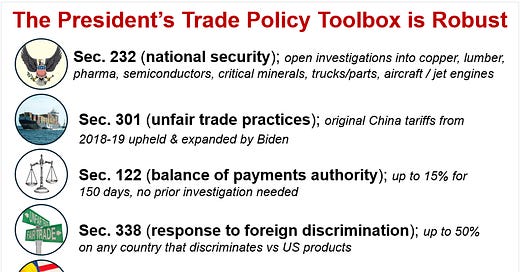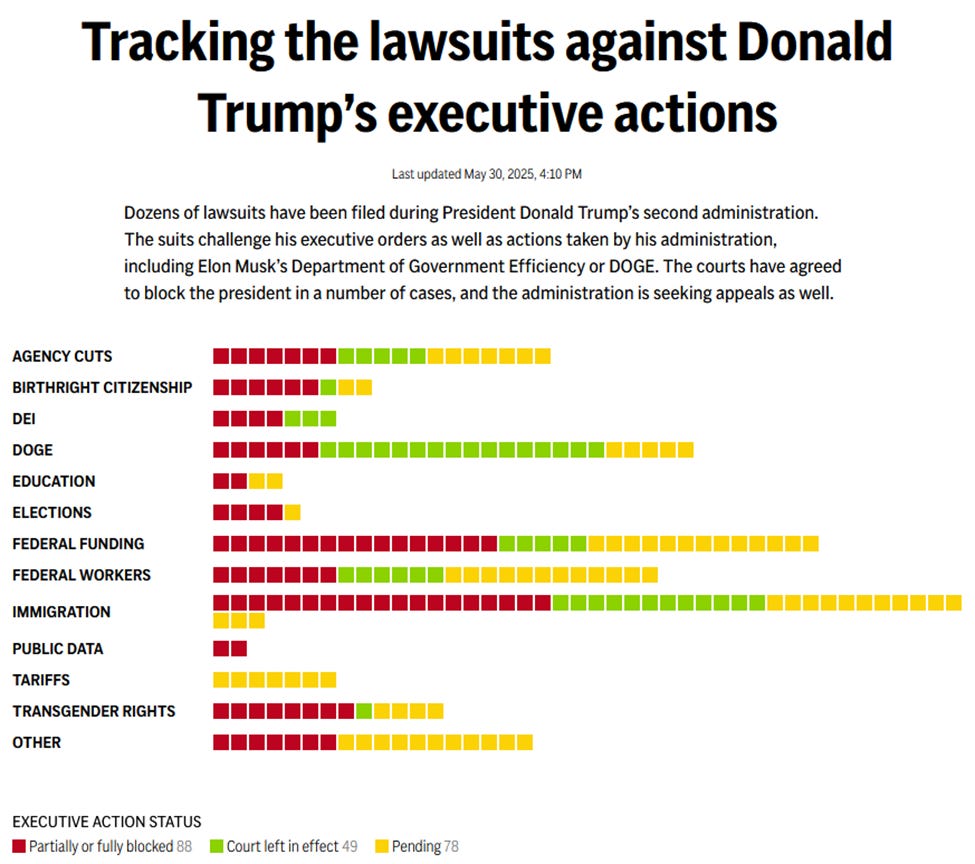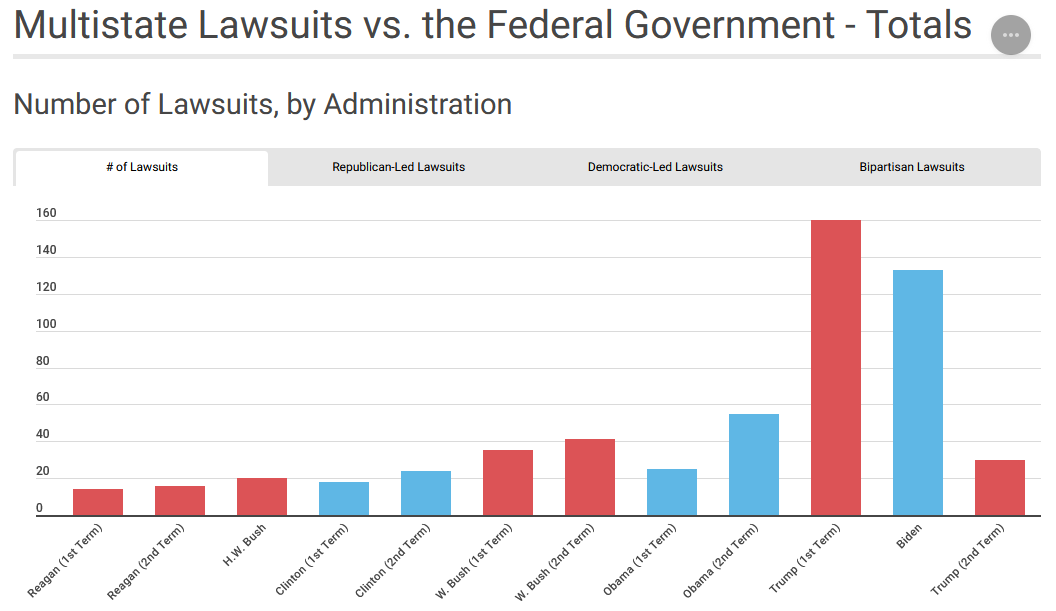Six-Chart Sunday – Overruled: POTUS v SCOTUS
6 Infographics + 1 Video (Chef José Andrés on philosophy, philanthropy & gastronomy)
What happens when Presidents lose in court? The Trump Administration has recently suffered a series of judicial defeats, on issues including trade, targeting of law firms, immigration, Harvard, and DOGE, with the pace of loss accelerating. All losses are being appealed. While White House rhetoric in response to adverse decisions has grown hotter, disputes between the Executive & Judicial branches are hardly new & rarely precipitate “constitutional crises.” Most Presidents stymied by judicial rulings find alternate approaches to advance their desired policies… changing the how more than the what. Here’s a look at present battles and historical precedents.
The Trump Administration faces a historic number of lawsuits. While all modern Presidents have found their actions and initiatives challenged in courts, none have faced more lawsuits than Trump 2.0. More than 250 cases have been filed against Trump Administration actions so far in 2025, and “as of May 30, at least 182 of those rulings have at least temporarily paused some of the administration’s initiatives” (NYT).
Presidents usually find different legislative authorities to advance their agenda when initially blocked by courts. After SCOTUS blocked President Biden’s effort to forgive ~$600B in student debt, for example, “the Biden administration shifted its focus to maximizing relief through existing mechanisms” and still found ways to forgive $183.6B. (As President Biden famously bragged, “The Supreme Court blocked it. But that didn’t stop me.") While the U.S. Court of International Trade this week rejected Trump’s use of the International Emergency Economic Powers Act of 1977 (IEEPA) for certain tariffs, the Administration has many other tools to impose tariffs and President Trump will surely persist with his ambitious trade agenda.
Presidents often “work the refs” or try to change them. Throughout U.S. history, presidents have voiced discontent or defiance toward Supreme Court decisions, rulings or actions they did not like. Some presidents have openly criticized the Court's interpretation of the Constitution, while others have attempted to influence the Court's composition or power through various means, such as FDR’s court-packing plan. While many observers object to the current Administration’s unusually-aggressive public criticism (e.g. calls for impeachment of judges via social media), others point to prior events such as President Obama’s 2010 State of the Union (“ripping” the Court for its Citizens United decision) and President Biden (“admonishing” SCOTUS for its Dobbs abortion decision at the 2024 State of the Union).
Presidents have ignored Supreme Court rulings. Court rulings do not always create affirmative obligations on presidents, as Courts are more likely to proscribe things presidents cannot do rather than dictate what they must do. Presidents have failed to act to enforce Supreme Court decisions (Jackson), directly defied rulings (Lincoln) and effectively undermined rulings (Nixon).
Presidents can directly overrule court decisions in matters of crime & punishment. The Constitution gives the president the “Power to grant Reprieves and Pardons for Offences against the United States, except in Cases of Impeachment.” Former President Joe Biden “granted more acts of clemency than any previous chief executive on record,” according to a Pew Research Center analysis, including pardons for family members both for prior convictions and for any crimes not yet discovered. In his second term President Trump is making robust use of clemency powers as well: “Beyond the nearly 1,600 ‘Day 1’ pardons and 14 commutations handed out to those charged in the Jan. 6, 2021, attack on the U.S. Capitol, Trump has so far pardoned or commuted more than 60 individuals.” (ABC News)
Sometimes Presidents need to ask Congress for legislative authorities. Some Supreme Court decisions clearly block desired Presidential action, with no obvious alternative pathways. Examples include Truman’s attempt to nationalize steel mills during the Korean War, Clinton’s effort to dismiss Paula Jones’ sexual harassment case, George W. Bush’s ordering military tribunals for Guantanamo Bay detainees and President Obama’s would-be recess appointments when the Senate was not technically in recess. One area to watch in 2025 is the Trump Administration’s effort to cut federal spending via “impoundment,” which the Government Accountability Office this week found violated the Impoundment Control Act by blocking spending on electric vehicle charging stations. That case is one of 30 multi-state lawsuits already brought by states against the Trump Administration, a record pace for 130 days into a new term.
SO WHAT? Our legal system remains a critical check-and-balance against executive overreach, whether by Democratic Presidents or Republicans. But court decisions are often limited in scope and effectiveness. While litigation tracking is increasingly critical for businesses, universities, NGOs or investors aiming to understand and anticipate policy trends, observers should not expect definitive Court rulings that end debate, drama or deliberation.
VIDEO
Chef José Andrés is changing the world for the better. We chatted yesterday about his new book and his thoughts on the power of individuals to make a difference. Great book and a truly inspirational leader.










I wish a few Republicans would step up, like John McCain did for Obama Care. Six-Chart is alway a great read. Thank you!
If Congress did its job, the Courts would not have to work so hard.